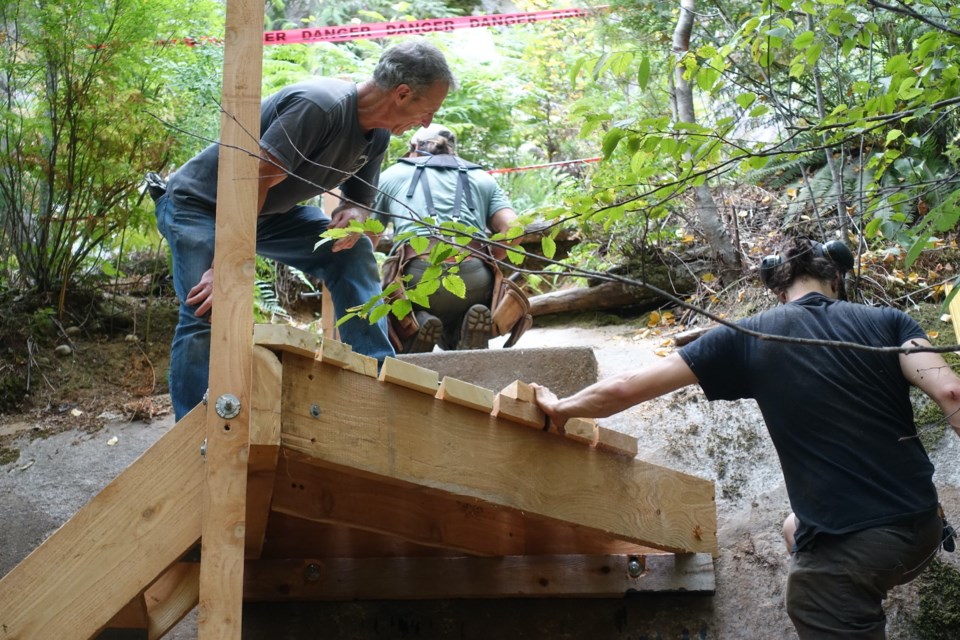A couple of weeks ago, I spent the weekend working with volunteers on a trail project at the as part of the .
We spent Saturday morning carrying in materials and preparing the site, and then Sunday cutting and assembling the lumber into a beautiful new set of stairs. If you aren’t familiar, the Malamute is that smaller chunk of granite below the Stawamus Chief, overlooking the log sort and the �鶹�����Terminals.
Though it is dwarfed by both the Stawamus Chief and Slhanay, it has a big part in the history of climbing advocacy and access in Squamish.
Climbers have been active on the Malamute for almost 60 years now.
The 1967 Woodsworth guide (details a few routes established in 1963 by climbing pioneers Jim Sinclair and Tony Cousins.
Over the years, many routes were added, gradually spider webbing across the granite.
As new routes were established, some were also closed; rescues and near misses on the railway at the base of the wall led to a crackdown by CN rail.
Climbers were only allowed on routes more than eight metres away from the tracks, and thereby barred from classics like Clean Crack, and some of Sinclair and Cousins' original routes on the formation.
Although disappointing, it was conceded that there was a valid safety concern, and in any case, it was not a battle the access organization could win.
The true success story of advocacy at the Malamute came in 2010 when it was bought by the BC government and added to the Stawamus Chief park. Climbers had been working for many years to protect the Malamute, but the campaign was brought to a head in 2007 when the owners at the time, Malamute Holdings, tried to capitalize on their property by illegally logging over 1,000 trees, devastating the area and blocking access for months.
Ultimately, the outcry over this and the persistence of advocates led to the acquisition of the Malamute and the construction of the prominent blue footbridge to it crossing the highway.
As we recently worked on the new stairs, the scars of that logging were still evident. We worked between the stumps of great cedar trees that would have towered over the highway (from a cut 120 years ago), and the still-recovering forest was thick and tangled. The old trail had climbed up a hemlock log abandoned after the logging, with steps carved into it by some handy individual. This was now rotting back into the forest and long overdue for replacement.
After a few hours of toil, with a brief break for fish and chips, the new stairs were finally assembled. We had been almost undisturbed all day, but it seemed everyone had just been waiting till our work was done.
As we tidied our tools, the climbers, hikers, and even mountain bikers began to trickle through and make use of our handiwork. While the stairs got all the attention, our project was only possible due to the long battles to protect this place for the enjoyment of future generations, climbers and non-climbers alike.
Alex Ryan Tucker is a �鶹�����resident and �鶹�����Access Society board member. Go to for more information on SAS.
*Please note that this story was updated after it was first posted to add "opinion" to the headline. This was accidentally left off when it was first posted. We also added that the cedar stumps were originally cut about 120 years ago, not in 2007, as was implied. The �鶹����� regrets this error.




